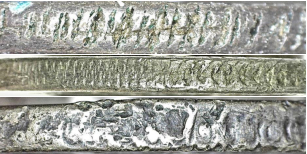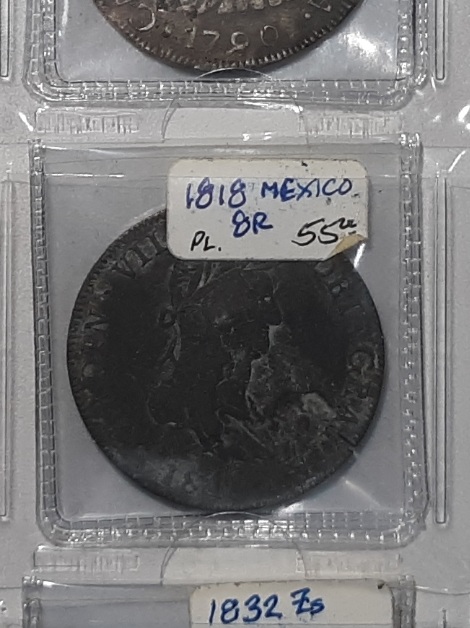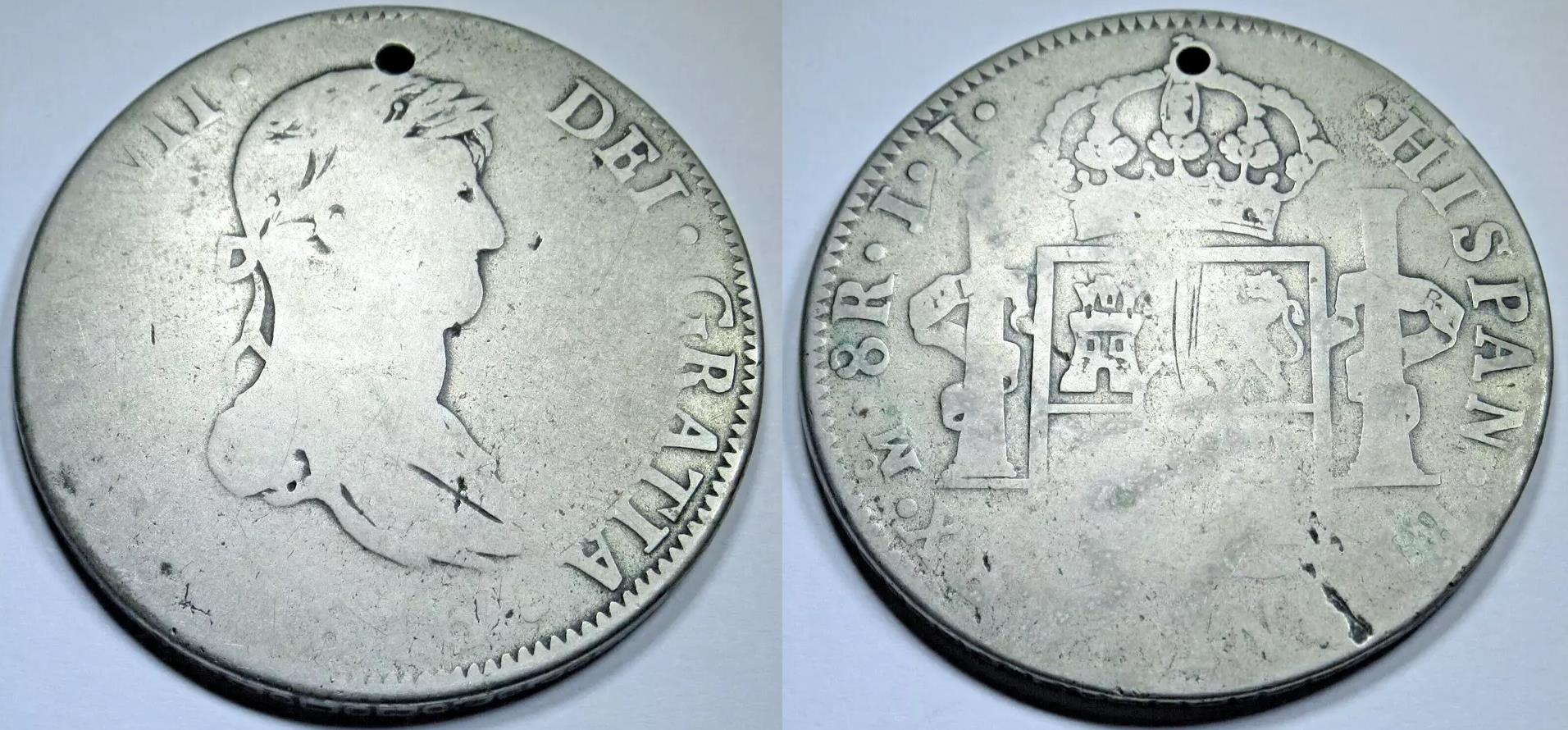| Author |
 Replies: 33 / Views: 5,714 Replies: 33 / Views: 5,714 |
|
|
|
Pillar of the Community
 United States
5361 Posts |
I normally do not disclose non-published contaminants in the event that they possibly could be avoided in the future by forgers. This is a case like that. The contaminant is modern and doe not belong in any period copy of a Mexican coin.
I know that can be frustrating, but in this case it is not necessary. The coin is always a variety of German Silver easily detected by Specific Gravity.
|
|
Pillar of the Community
United States
1932 Posts |
In theory, even though the density is low, you probably could have fooled SOME people somewhere in the 1800s - just not astute merchants/bankers. And even by the 1830s there WERE still some portrait 8R floating around, especially in the South, so it wouldn't be TOTALLY bizarre to encounter one... though clearly the then-current Cap & Rays had become most common.
Nonetheless, with the modern contaminant present and the "fabric" of the strike (the edge/rim DO look 20th Century), it seems whoever produced these put a good amount of effort into artificially aging them to pass them as numismatic fakes.
Of course, that begs the question - how many collectors from say 1960 on would mistake this obviously incorrect design for a genuine 1816-Mo 8 Reales? I guess when Stack's in 2021 can let one slip by as genuine in a group lot... the answer is "enough".
|
|
Pillar of the Community
 United States
5361 Posts |
realeswatcher You are exactly correct when you say; Quote:
I guess when Stack's in 2021 can let one slip by as genuine in a group lot... the answer is "enough". There is no need to postulate an early origin for the type based on design. As you also point out the edge on a pristine copy could be hardly any more modern in appearance. In the 1960s when this type was likely produced - NO ONE looked at the edge. I believe the Romano's were the first to tell me to always look at the edge first. The modern contaminant just seals the deal. Regarding the fact that the designs do not match - back in the 1960's there were few reference books that illustrated what 8 reales looked like by date let alone by date and sub-type. The assumption at that time was that Mexican 8Rs were cruder than modern coins and that many differences in style was the rule rather than the exception. That is why many "experts" from that time frame included counterfeits in their publications as genuine or as pattern strikes. Many of those are still treated as genuine or as pattern issues even when the differences are now very obvious because we have many more counterfeits to compare them with. The target of the forgers in this case were the collectors of the 1960's. There are a few others that were first issued back then like the 1882 Zs JS 8R which in a slightly modified form is still in production by the Chinese. These are examples of what will still sell.  This coin is a great example of the difference between a Numismatic Forgery and a genuine Contemporary Counterfeit. Like all other Numismatic Forgeries it is essentially worthless. Right now on ebay you can see a dozen or more versions of Numismatic Forgeries of C&R 8Rs that are selling very well. The sellers are mostly from Poland. These are eastern european forgeries that have reeded edges yet they sell very well.
|
|
Pillar of the Community
United States
1805 Posts |
swamperbob got me to take a look at some edges of my fake Cap & Rays.  Here are edges from four more Cap & Rays  And then I found two more.  Edited by Albert
10/10/2021 7:44 pm
|
|
Pillar of the Community
United States
1932 Posts |
Quote:
The target of the forgers in this case were the collectors of the 1960's. I'm reminded of something like this: 
|
|
Pillar of the Community
 United States
5361 Posts |
I agree. Crude forgeries passed muster in the 1960's. However, I believe I have seen one or two of those on ebay in the recent past. They are now selling to the uninformed as CCC types which is unfortunate. |
|
Pillar of the Community
United States
1932 Posts |
I actually fell into that trap some years ago on one of these. Further observation, appearance of multiple dates, etc. revealed what it was. I now presume it's a mid-century creation like the 1816 discussed.
I actually think most people buy them thinking they're genuine pillar 8R.
|
|
Pillar of the Community
 United States
5361 Posts |
Some of the bidders clearly think they are genuine - that is worse than believing they are CCC types.
The only potential plus for these older NF types are that as they increase in age and they become 50-70 years old or more, there is some value based on the older techniques that were used to make them. New counterfeit collectors do need to see these older types to become familiar with techniques.
So far it is still relatively easy to spot the NF types, but I do envision the day when forgers will be specifically copying counterfeit coins such as the ones shown in Riddell's book. Then it will become essential to be able to recognize how each type was created and to what historic era the technique belongs.
|
|
Pillar of the Community
United States
1932 Posts |
So... I was going through some pics today and it occurred to me that one example of this "1816" type in question which I had pulled from Worthpoint ebay archives (first pic below) was in fact a specimen I had seen before in a grouping of primarily contemporary counterfeit 8R (a few genuine pieces mixed in) at a show a few years back. They were mostly or all Mexico... Colonial Mo mint, a few "questionable" Royalist branch mint, one Iturbide, plus some early Cap & Ray. I bought a few pieces but also took quick pics of the main binder sheet; some of these pieces then ended up on ebay about a year ago from (I think) a different dealer in the region. These pieces were predominantly deeply/darkly-toned and most had old blunt damage marks that appear to have been crude cancellations. My overall impression was that this was an contemporary grouping of "fake money" that someone had accrued, cancelled and then buried. Shown below was the ebay pic I previously linked plus a few screenshots of the grouping. The coin in question is mistakenly called "1818" in the binder sheet - the toning pattern clearly show it's that exact coin. Anyway, food for thought. Could be recent environmental damage to a collection stored together in really poor conditions, but it really didn't present like that.    |
|
Pillar of the Community
 United States
5361 Posts |
The very dark color does look like the group may have been buried but many I ran into in the 1960s looked that way as well. I come from New England where the soil is often acidic from pine needles and it was easy to get discoloration from a 6 month burial.
I now live in North Carolina where there is sulfur in the groundwater. Just placing a sterling silver ring in the water here causes the development of silver sulfide on the surface in a day or two.
Another factor to consider are the stories that were common in the 1860s of forgers placing their coins in manure to age them.
So the inclusion of both modern 1950's, 60's vintage coins with older Contemporary counterfeits is common.
|
|
Pillar of the Community
United States
1932 Posts |
Quote:
So the inclusion of both modern 1950's, 60's vintage coins with older Contemporary counterfeits is common. Well, yeah, there were (are) a lot of dealers and even some collectors who are knowledgeable and sharp-eyed enough to spot a "not genuine" coin... but yet not sophisticated enough to appreciate contemporary counterfeits... who would simply throw all their "fakes" together in a "black cabinet" without much further thought. However, would such a grouping be stored in conditions that would cause such dark toning as most of these pieces had? How damp was that basement?!!
|
|
Pillar of the Community
United States
1932 Posts |
|
|
Pillar of the Community
 United States
5361 Posts |
That example exhibits a great deal of copper corrosion, but that alone does not make me change my mind. The coin is modern without any doubt. The method of manufacture is incorrect as physically evidenced by the appearance of the edge on examples that are near MS. The very few other clues to modernity are more difficult to explain unless you observe dozens of identical examples until a statistical pattern appears.
The contaminant that appears in some examples is absolute proof of modernity because it is an element not naturally occurring in Mexican silver strata and which was not used commercially until the 20th century. However, some other examples of the same coin are made with other alloys which do not contain the modern element. Various alloys are common for any series of counterfeits both contemporary and modern, but it only takes only one example made with an impossible element to taint all other examples of the same die pairing.
|
|
Valued Member
United Kingdom
324 Posts |
Good morning! That conversation was an eye opener! I'm so glad I joined this community. Very valuable information. In England we tend to be a bit more lenient with contemporary counterfeiters, though we don't expect their products to attract prices anywhere near the real thing.
|
|
Pillar of the Community
United States
1932 Posts |
Even more heavily worn than the piece posted back on Page 1. Interesting there's an almost identical slash mark on the chest compared to that same piece...  |
| |
 Replies: 33 / Views: 5,714 Replies: 33 / Views: 5,714 |





























